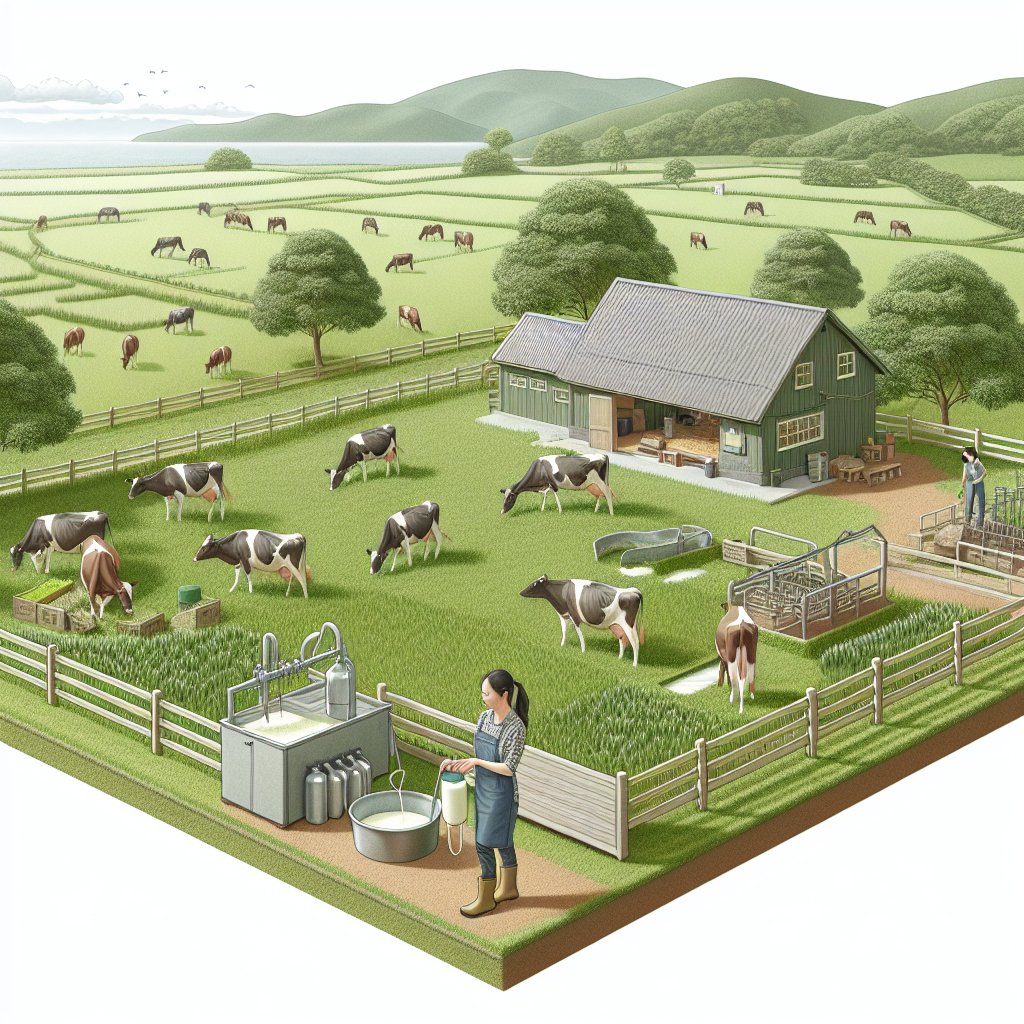Establishing a small organic dairy farm is a rewarding venture that combines sustainable agriculture practices with the production of high-quality dairy products. This article will guide you through the essential steps and considerations for setting up your own organic dairy farm, from selecting the right livestock to managing pasture and ensuring compliance with organic standards.
Choosing the Right Livestock
The foundation of a successful organic dairy farm lies in selecting the right breed of cattle. Different breeds have varying milk production capacities, temperaments, and adaptability to organic farming practices. Common breeds for organic dairy farming include Holstein, Jersey, and Guernsey, each offering unique benefits.
Holstein: Known for their high milk yield, Holsteins are a popular choice for dairy farmers. However, they require careful management to maintain health and productivity in an organic setting.
Jersey: Jerseys produce milk with a higher butterfat content, making it ideal for cheese and butter production. They are also known for their efficient feed conversion and adaptability to pasture-based systems.
Guernsey: Guernseys are valued for their rich, golden milk and docile nature. They thrive in pasture-based systems and are well-suited for organic farming.
When selecting livestock, consider factors such as milk production goals, climate, and available resources. It’s also important to source animals from certified organic farms to ensure compliance with organic standards from the start.
Pasture Management and Feeding
Effective pasture management is crucial for the health and productivity of your dairy herd. Organic standards require that livestock have access to pasture during the grazing season, which typically lasts at least 120 days per year. This not only supports animal welfare but also enhances the nutritional quality of the milk.
Rotational Grazing: Implementing a rotational grazing system can optimize pasture utilization and improve soil health. By dividing your pasture into smaller paddocks and rotating the herd through them, you allow grass to recover and maintain its nutritional value.
Supplemental Feeding: While pasture should be the primary food source, supplemental feeding may be necessary to meet the nutritional needs of your herd, especially during the non-grazing season. Organic feed, such as hay and silage, must be sourced from certified organic suppliers.
Soil Health: Maintaining soil fertility is essential for productive pastures. Organic practices such as composting, cover cropping, and natural fertilizers can enhance soil health and support sustainable pasture management.
Compliance with Organic Standards
Adhering to organic standards is a critical aspect of running an organic dairy farm. These standards are designed to promote environmental sustainability, animal welfare, and the production of high-quality organic products.
Certification Process: To market your dairy products as organic, you must obtain certification from an accredited organic certifying body. This process involves a thorough review of your farming practices, including livestock management, feed sources, and pasture management.
Record Keeping: Maintaining detailed records is essential for organic certification. This includes documentation of feed purchases, veterinary treatments, and pasture management practices. Accurate records demonstrate compliance with organic standards and facilitate the certification process.
Animal Welfare: Organic standards emphasize the importance of animal welfare. This includes providing access to pasture, ensuring adequate space and shelter, and minimizing stress through gentle handling practices.
Marketing and Selling Organic Dairy Products
Once your organic dairy farm is up and running, developing a marketing strategy is key to reaching your target audience and maximizing profitability. Organic dairy products are in high demand, and effective marketing can help you capitalize on this growing market.
Branding: Establishing a strong brand identity can differentiate your products in the marketplace. Highlight the unique qualities of your organic dairy products, such as their nutritional benefits, environmental sustainability, and animal welfare practices.
Direct Sales: Selling directly to consumers through farmers’ markets, farm stands, or online platforms can increase your profit margins and build customer loyalty. Direct sales also provide an opportunity to educate consumers about the benefits of organic dairy products.
Partnerships: Collaborating with local retailers, restaurants, and food cooperatives can expand your market reach and increase sales. Building relationships with these partners can also enhance your farm’s reputation and visibility in the community.
Challenges and Considerations
While setting up a small organic dairy farm offers numerous benefits, it also presents unique challenges. Understanding these challenges and planning accordingly can help ensure the success of your venture.
Initial Investment: The cost of establishing an organic dairy farm can be significant, including expenses for livestock, infrastructure, and certification. Careful financial planning and access to funding sources, such as grants or loans, are essential.
Labor Requirements: Organic dairy farming is labor-intensive, requiring daily management of livestock, pastures, and record-keeping. Hiring skilled labor or investing in training can help manage these demands effectively.
Weather and Climate: Weather conditions can impact pasture availability and milk production. Developing a contingency plan for adverse weather, such as drought or excessive rainfall, is crucial for maintaining farm operations.
In conclusion, setting up a small organic dairy farm involves careful planning, dedication, and a commitment to sustainable practices. By selecting the right livestock, managing pastures effectively, and adhering to organic standards, you can create a thriving farm that produces high-quality organic dairy products. With the right marketing strategies and an understanding of the challenges involved, your organic dairy farm can become a successful and rewarding enterprise.
